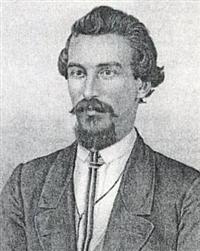Search:
Powered by
Website Baker
Christmas Season in the Third Louisiana Regiment |
| Posted by The Muse (themuse) on Dec 24 2013 |

Living in Baton Rouge, Louisiana, Will Tunnard had joined the Pelican Rifles in the fall of 1859. Thus in January 1861, Tunnard was part of the State Militia that had taken possession of the Federal Arsenal in Baton Rouge, a week or so prior to Louisiana seceding from the Union. Later in May 1861, the Pelican Rifles became Company K in the Third Louisiana Volunteer Infantry Regiment. The regiment was assigned to the Confederate Brigade commanded by Brigadier General Ben McCulloch.
Sergeant Will Tunnard fought at the Battle of Oak Hills (Wilson’s Creek) in August 1861. By winter, McCulloch had withdrawn to northern Arkansas, and his brigade had gone into winter quarters at Cross Hollow, about seven miles southeast of Bentonville, Arkansas. Sergeant Tunnard described the setting in what they called Camp Benjamin.
"The quarters of the Louisiana Regiment were situated in one of the valleys of Cross Hollows, protected from the chilly, wintry winds by high, rocky hills, covered with a heavy growth of timber. They were substantial wooden buildings, constructed of tongued and grooved planks placed upright, with roofing of the same material. The flooring was the very best, and would have been a credit to the handsomest of private residences. Each building was 38 by 20 feet, divided into two rooms by a partition meeting in the center at the chimney, constructed of brick, with a fire-place in each room, with a smooth brick hearth. The privates’ quarters were in two parallel rows facing each other, while the officers ran perpendicular to them, forming a square at one end. The men were not too much crowded, and slept in berths placed one above the other, similar to those in a state-room of a river steamer. The utmost contentment and good feeling prevailed among the men, and all seemed determined to enjoy the days of the winter months. With abundant material for the purpose, they soon manufactured chairs, tables, shelves, and mantle-pieces over the fire-places. Most agreeably were they disappointed at their situation and surroundings. They soon gathered about them all those little comfort’s and conveniences which so materially contributed to the happiness of a soldier’s precarious existence. The buildings were soon named according to the inclination of the occupants, and a stroll through the quarters exhibited to the view grotesque lettering, telling of all kinds of “Dens,” “Retreats,” and “Quarters,” while you could easily discover “Bull Run,” “Leesburg,” “Belmont,” and other streets. “Manassas Gap” opening into “Capital Square,” the officers’ quarters.
"Behold now these war-worn, yet jovial soldiers, preparing to pass the winter months! On the 11th of December the scene in Camp Benjamin was one of peculiar activity and bustle, for the announcement had been made that the buildings were ready for occupation. They were apportioned to the companies, and the men eagerly and zealously proceeded to fit them up for permanent residences. The day was a fine one, the atmosphere cool and bracing. Halloo, song, and laughter echoed along the valley, and over the hill-tops, while from a grist-mill nearby came the monotonous splash of its huge water-wheel, mingled with the clank of machinery and the peculiar whirr and rumble of its mill-stones. The frowning hill-sides there never looked down upon such a scene of bustle, activity, and hilarity.
"Thus the regiment became established in their winter-quarters, surrounded with nearly every comfort a soldier’s heart could desire. There was a sad deficiency, however, in the Medical Department, and numbers of the men on the sick-list with diseases so dangerous to those unaccustomed to such a rigorous climate. These sons of a sunnier clime felt most acutely the piercing wintry air, and from exposure and negligence in providing against the constant atmospheric changes, made themselves victims to the approach of insidious diseases …
"[On December 22] there was a heavy fall of snow. A scene of uproarious mirth ensued. There was a general “ducking” of all, irrespective of rank, and fierce battles with snow-balls. It was hazardous for anyone to venture in sight, as he would be most unmercifully pelted with snow …
"Christmas Eve, the holiday festivities, and foaming bowls of egg-nog, with raw liquor, seemed as plentiful as the spring water nearby. Uproarious hilarity prevailed, the absent were toasted in many a cup, and songs sung with eventually discordant chorus. The next day was Christmas. Soldiers loved to dispense hospitality, consequently there were numerous gatherings of convivial spirits, and egg-nog was drank with all the eclat and formality of a drawing-room assembly, or hilariously tossed off with a jovial toast and upraised cups."
Image Credit
- Ben McCulloch, WICR 31451 in the collection of Wilson’s Creek National Battlefield, image courtesy of the National Park Service
Reference
- Tunnard, William H. A Southern Record: The History of the Third Regiment, Louisiana Infantry. Baton Rouge: W. H. Tunnard, 1866.
Last changed: Dec 24 2013 at 12:39 PM
Back